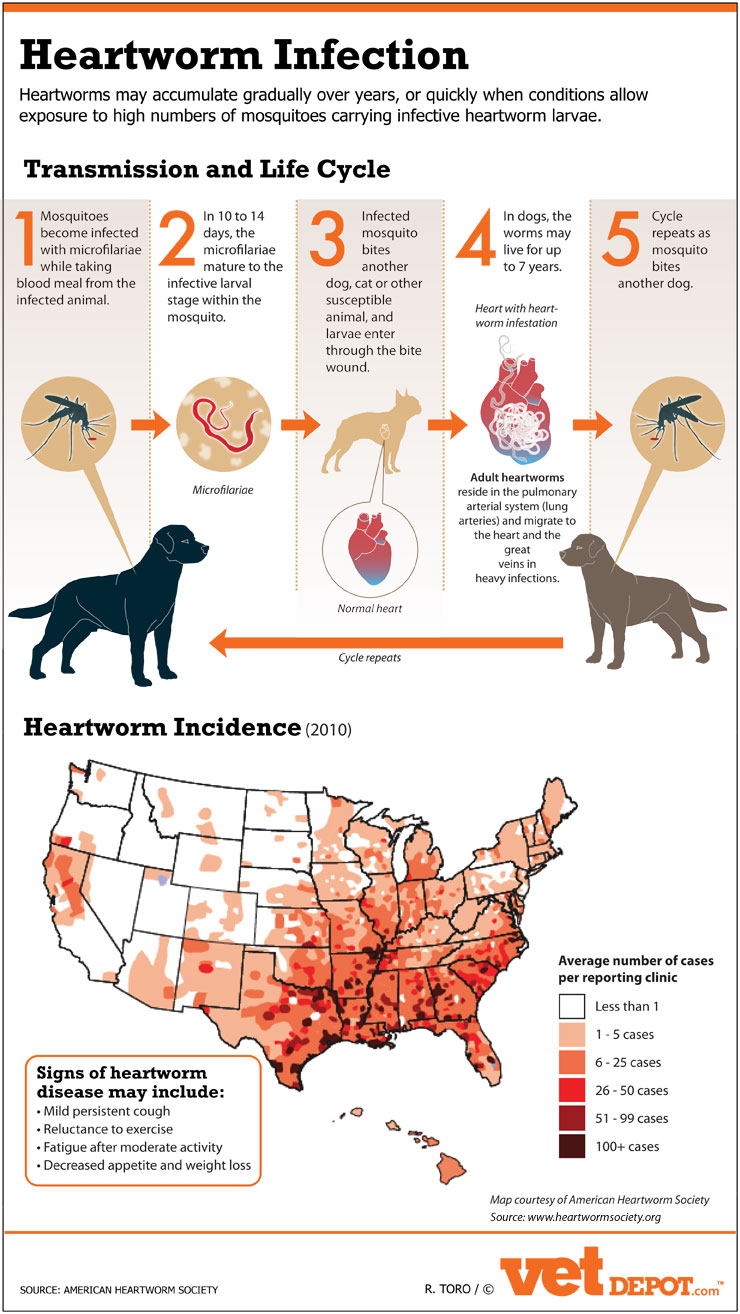Heartworms are long round parasites
that live in the heart and lungs of dogs. Heartworms are transmitted
from one individual to another when a mosquito feeds on the blood of
an infected dog and then bites an uninfected dog later. It is impossible
to completely protect against mosquito bites, so all dogs are at risk
for heartworm disease. Heartworm has been diagnosed in dogs in all 50
states, plus associated territories such as Puerto Rico and also in
Canada.
Why Should Pet Owners Be Concerned?
Adult heartworms are big. Some
can grow to be 14 inches long, so when a large number of the parasites
invade a dog's heart and the blood vessels leading into the lungs, a
lot of damage can occur. The combination of the physical presence of
the worms and inflammation from the dog's immune response makes it difficult
for the heart to pump blood through the lungs. When the blockage becomes
severe enough, heart failure develops. Adult worms breed and produce
larvae called microfilariae that circulate in the dog's blood stream,
causing organ damage as they travel around the body. Heartworm disease
is often fatal if left untreated.
How Do I Know If My Pet
Has Heartworms?
A dog that has a new or mild
case of heartworms may show no clinical signs at all. This is why heartworm
tests are so valuable; they can diagnose dogs before a lot of damage
has occurred and when treatment is at its safest and most effective.
Early diagnosis is not only more effective – early treatment is also
generally less expensive. As heartworm disease progresses, most
dogs begin to cough. They may also lose weight, tire easily, have difficulty
breathing and develop a pot-bellied appearance if fluid accumulates
in the abdomen. Some dogs may experience sudden death.

Veterinary Care
If you suspect that your dog
might have heartworms, see your veterinarian. He or she will run a heartworm
test. A small amount of blood will be drawn for the test. Most tests
look for an immune response by the dog's body against these parasites.
In some cases, the larvae or microfilaria can be seen in the blood sample.
If the test comes back positive, treatment should begin as soon as possible.
If the test is negative, there is still a chance that your dog is in
the early stages of developing a heartworm infection and might come
up positive on a repeat test in a few months. Follow your veterinarian's
recommendations when it comes to repeat testing.
A heartworm positive dog will
need to undergo additional diagnostic testing, such as chest x-rays,
blood work, and a urinalysis, to determine how much damage has occurred,
the best form of treatment for him, and his prognosis. Treatment will
be customized to your individual dog. Most dogs will receive medication
to kill circulating microfilariae and a series of injections over
a month's time to kill adult worms in the heart and lungs. In some cases,
oral medications may be used in place of the injections. Hospitalization
at the time of these injections is necessary so that your veterinarian
can watch closely for side effects. As the adult worms die off, they
may form clots or stimulate severe inflammation that can be life threatening
to your dog. Other treatments may also be given based on an individual
dog's condition.
Home Care
While a dog is being treated for heartworms,
he must rest. If your pet has been sent home, follow your veterinarian's
instructions closely and call the clinic immediately if you notice a
decline in your dog's condition.
Prevention
The good news about heartworm
disease is that prevention is very easy. Prevention is much safer and
less expensive than treatment.
Have your dog tested, and if he is negative, your vet will prescribe
one of the many safe and effective heartworm
preventative medications
that are now available. Most of these products also offer some protection
against intestinal parasites. Several heartworm medications, like Revolution, Sentinel and Advantage Multi control fleas as well. Your vet can
help you pick the best product for your dog.
Most heartworm preventatives
are a pill, chewable treat or topical solution that you give monthly.
Year round treatment is best to provide the highest level of protection
for your dog. Annual testing is still important even if you are very
good about giving your dog his medication on schedule. No preventative
is 100% effective, and if you can catch a heartworm infection in its
early stages, treatment is much more likely to be successful.
The above is provided for information purposes only and should not be used for the diagnosis or treatment of any condition.
This information does not cover all possible variables, conditions, reactions, or risks relating to any topic, medication, or product and should not
be considered complete. Certain product or medications may have risks and you should always consult your local veterinarian concerning the treatment of
your pet. Any trademarks are the property of their respective owners.